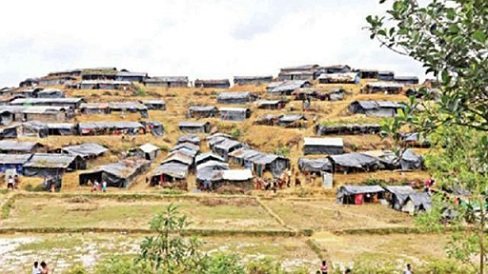Two thousand tube wells, Rohingya in water crisis

Cox's Bazar's 30-odd refugees in Tekman and Teknaf have under fire crisis. Rohingyas are suffering from various diseases, including diarrhea, eating natural water bodies, canals and ponds.
After finding out about the situation, two thousand of the tube well has already been stuck. The reason for the level of groundwater falling abnormally down Apart from this, several other tubewells have been damaged due to lack of maintenance.
Ashra Shasibir of Ukhia Madhurchara 1 and 2, 45 kilometers away from the city of Cox's Bazar. Hundreds of more Rohingya are living in Tripoli's house on the slopes of this camp. There is another hundred thousand Rohingya in the adjacent Lambasa 1 and 2 camp. More than 1,000 tube wells were set up in the camps to meet the requirements of 2.5 million Rohingyas.
In the camps on Wednesday, many tube wells have been found to be unusable. The upper part of some tube wells have been stolen. Women and children were seen to bring water from distant water ponds, ponds and canals.
Lembashia-1 of Ashbashibir B Block (Sardar) Abul Hossain said, in September-October last year, several non-government organizations set up a few tube wells in the depth of 20-35 feet in the slope of the hill. Cox's Bazar, Brac, Seeds, and others released a few deep tube wells in the camp in January-February this year. Most of these tubewells are operational.
Syed Karim said that the NGOs under the supervision of Rohingya Majidis after the installation of the tube well was given to them by the double zero block of Madhurshara shelters. Now, due to lack of maintenance, several tanks remain unoccupied. Many tube wells can not be opened for a leather or stroke of 20-30 taka.
Biml Dey Sarkar, chief executive of Cox's Bazar, released Mukesh said they established 34 tubewells of 605 to 785 feet deep in Lambasiya and Madhurshara shelters. In contrast to each well, costing 1 million 30 thousand taka. Rohingyas are responsible for the maintenance of tube wells. Now there is no allocation for the operation of the tube well, but it is not allocated to operate.
According to the NGO-related branch of the district administration, 7 thousand 65 tube wells have been installed in shelters in the last 8 months till May 7. Among them, 2,528 people have established the Department of Public Health Engineering. The remaining 4,537 tube wells have been set up by private organizations.
Ukkhia Upazila administration sources said that in order to meet the demand of lakhs of Rohingya water along with tube wells, the Department of Public Health Engineering started 12,000 liters of drinking water daily in Ukhia's Kutupalong and Baluchali shelters through two treatment plants. Various agencies supplied 89,000 liters of pure water daily daily. Now there is no water supply. Daily demand of more than 11 lakh Rohingyas is 1.6 million liters. There are three sources of water that are not available.
The Rohingyas complain that in the shelter, women are facing more problems in bathing. A few months ago, the baths of Tripura and Bamboo fencing were made at different places in Shibir but now all the shocks have become. There is no reform initiative.
According to the district administration, there are 1,780 bathrooms in the shelters. Of these 490 public health engineering departments, the rest 1,290 have been created by private organizations. But they also have no maintenance.
Public Health Engineering Director Cox's Bazar Executive Engineer Ritik Chowdhury said, the work of establishing one thousand deep tube wells in Ashrashibir has been started to solve the water crisis. Their depth would be 500-900 feet.
Agriculture Officer of Ukhiya Upazila Shariful Islam said, before the water was found in 40-50 feet deep water in different areas of the upazila. Now water is not available 600 to 900 feet. At least 2,000 tube wells have become dehydrated in different areas of the upazila. Farming is also being hampered due to the water scarcity in the upazila.
In this regard, Additional Deputy Commissioner (Education and ICT) Mohammad Ashraf Hossain, who is in charge of the NGO-related department of the district administration, said there are allegations of irregularities in establishing a tube well in the shelter. But it is not possible to investigate due to man-crisis. However, efforts are being made to remove watercaps by activating stand-alone tube wells.
Diary figure
Medical Officer of Ramu Upazila Health Complex, Mizbah Uddin Ahmed said thousands of Rohingya diarrhea, dysentery, and other diseases were also found in the Rohingya camps in the hill areas. Rohingyas get rid of some of the diseases, if the inadequate tube wells are activated.
According to the sources of the District Civil Surgeon's office, 30 lakh refugees from Ukhia and Teknaf were given medical treatment till Sunday 288 693 people suffering from severe diarrhea. Along with this, 93 thousand 8 Rohingyas have been infected with blood. In addition to drinking contaminated water, many people suffer from typhoid, hepatitis A, hepatitis E disease.